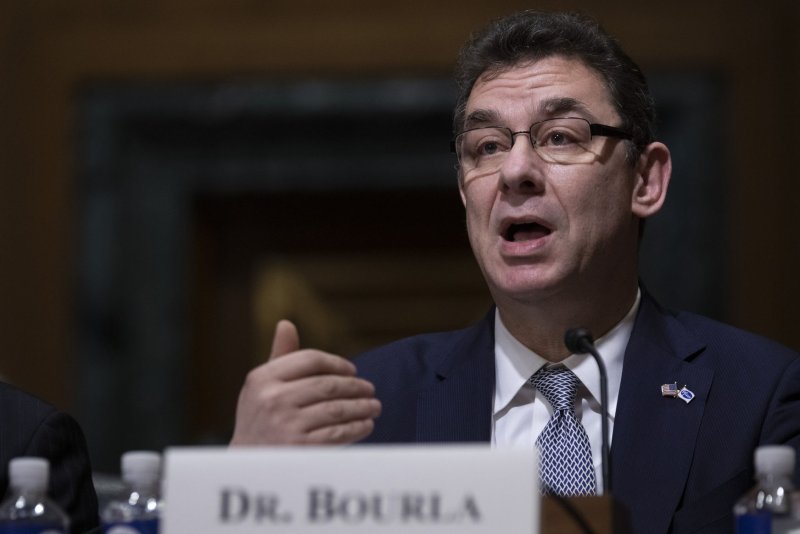1 of 8 | Albert Bourla, CEO of Pfizer, testifies during a Senate Finance Committee hearing on Drug Pricing in America on Capitol Hill on Tuesday. Photo by Alex Edelman/UPI |
License Photo
Feb. 26 (UPI) -- Executives from seven pharmaceutical companies said rebates to insurance companies force them to set higher prescription drug prices, during a U.S. Senate committee hearing Tuesday.
The executives from AbbVie, AstraZeneca, Bristol-Myers Squibb, Johnson & Johnson, Merck, Pfizer and Sanofi testified that although they control the price of commonly used prescription drugs, they are unable to lower the list prices.
"The system itself is complex and it is interdependent, and no one company could unilaterally lower list prices without running into financial and operating disadvantages," Merck CEO Kenneth Frazier said. "But if we all bring parties together around the table with the goal of doing what's best for the patient, I think we can come up with a system that works for all Americans."
The industry leaders said the high list prices are the result of a series of structural impediments, including being required to pay rebates to insurance companies and third-party pharmacy benefit managers.
Drug makers negotiate discounts, or rebates, with pharmacy benefit managers to secure a spot on their formularies.
Pfizer CEO Albert Bourla said insurance companies are not passing on the discounts from rebates to patients.
"None of the close to $12 billion of rebates that Pfizer paid in 2018 found their way to American patients," Bourla said. "Pfizer supports reforms that would create a system in which transparent, upfront discounts benefit patients at the pharmacy counter, rather than a system driven by rebates that are swallowed up by companies in the supply chain."
As part of the testimony, the executives said eliminating the rebates from throughout the commercial insurance industry, as the Trump administration has proposed to do for certain Medicare and Medicaid programs, would alleviate the problems.
Food and Drug Administration chief Scott Gottlieb told CNBC the pricing system is "wacky" and patients are seeing no benefit from rebates.
"[Patients are] spending money to subsidize everyone else's premium," Gottlieb said. "The sick people are helping to subsidize the healthy people. That's not how insurance is supposed to work. So we've got a wacky system where the discounts aren't flowing to the people."
Healthcare professionals say they've seen their patients priced out of the drugs they need.
Frazier acknowledged that list prices are "actually working against the patient."
"The people who can least afford it are paying the most," he said. "That's the biggest problem we have as a country. We have a system where the poorest and the sickest are subsidizing others."
After tweeting Monday he wants to see drug makers take some accountability, committee chair Sen. Chuck Grassley said he was pleased the companies didn't displace the blame "as much as I thought they would."
Grassley also said he plans for another hearing to question insurance companies and their allied pharmacy benefit managers.















